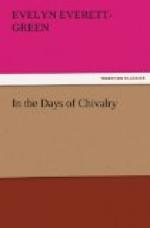A quick flush crossed Gaston’s cheek as the guerdon so dear to the heart of the soldier was thus thrust upon him; but a whisper in his ear held him back.
“Gaston, we have no name; we cannot receive knighthood without revealing all. Has the time yet come to speak? Of that thou shalt be the judge. I will follow thy wishes in this as in all else.”
For a moment Gaston stood debating with himself. Then the counsel of prudence prevailed over that of youthful ambition. How were he and his brother worthily to support the offered rank? Even did they make known their true parentage, that would not put money in their purses; and to be poor dependents upon the bounty of relatives who had rejected their mother and driven forth their father to seek his fortune as he could, was as repugnant to Gaston’s pride now as it had been two years before.
“Sweet Prince,” he answered, after this brief pause for thought, “we have but done our duty today, and knighthood is far too great a reward for our poor merits. Sure it has been honour and glory enough to fight by your side, and win this gallant day. We are but poor youths, without home or friends. How could we receive a reward which we could not worthily wear? A penniless knight without servant or esquire would cut but a sorry figure. Nay then, sweet Prince, let it be enough for us this day to have won these gracious words at your lips. It may be when fair fortune has smiled upon us, and we are no longer poor and nameless, that we will come to you to crave the boon you have graciously offered this day. We will remain for the nonce in our present state, but will ever look forward to the day when some other glorious victory may be won, and when we may come to our Prince for that reward which today we may not receive at his hands.”
“So be it,” answered the Prince, his face, which had clouded over with regret a few moments earlier, lighting up again at these latter words. “Be assured I will not forget you, nor the services ye have done me this day. I too in days to come shall have knighthood to bestow upon those who have earned the right to wear it. Fear not that Edward ever will forget. Whenever the day comes that shall bring you thus to me for the reward so nobly earned today, that reward shall be yours. The King’s son has promised it.”
CHAPTER XIV. WINTER DAYS.
“Nephew John, I have brought thee a companion to share thy winter’s solitude.”
John de Brocas, who was in his old and favourite retreat — his Rector-uncle’s great library — rose to his feet with a start at hearing the familiar voice of Master Bernard (whom he believed to be far away in France), and found himself face to face not with his cheery uncle alone, but with a tall, white, hollow-eyed youth, upon whose weary face a smile of delighted recognition was shining, whilst a thin hand was eagerly advanced in welcome.




